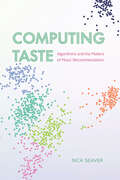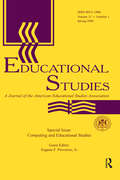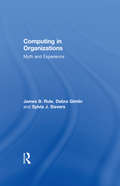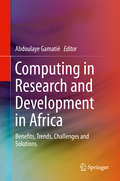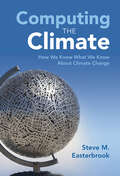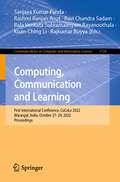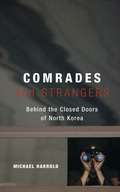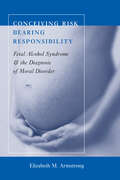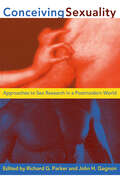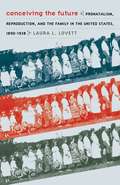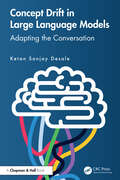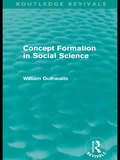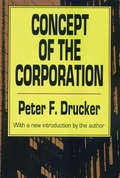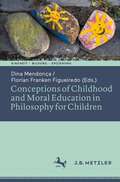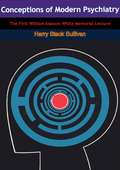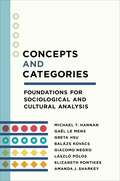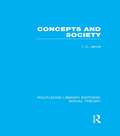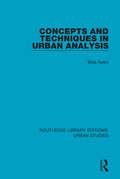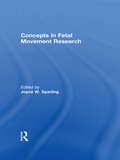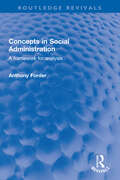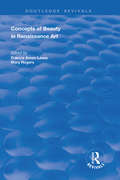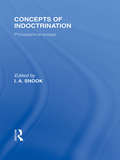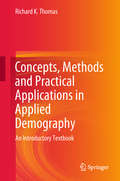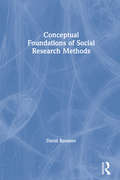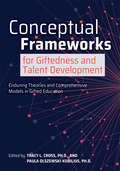- Table View
- List View
Computing Taste: Algorithms and the Makers of Music Recommendation
by Nick SeaverMeet the people who design the algorithms that capture our musical tastes. The people who make music recommender systems have lofty goals: they want to broaden listeners’ horizons and help obscure musicians find audiences, taking advantage of the enormous catalogs offered by companies like Spotify, Apple Music, and Pandora. But for their critics, recommender systems seem to embody all the potential harms of algorithms: they flatten culture into numbers, they normalize ever-broadening data collection, and they profile their users for commercial ends. Drawing on years of ethnographic fieldwork, anthropologist Nick Seaver describes how the makers of music recommendation navigate these tensions: how product managers understand their relationship with the users they want to help and to capture; how scientists conceive of listening itself as a kind of data processing; and how engineers imagine the geography of the world of music as a space they care for and control. Computing Taste rehumanizes the algorithmic systems that shape our world, drawing attention to the people who build and maintain them. In this vividly theorized book, Seaver brings the thinking of programmers into conversation with the discipline of anthropology, opening up the cultural world of computation in a wide-ranging exploration that travels from cosmology to calculation, myth to machine learning, and captivation to care.
Computing and Educational Studies: A Special Issue of educational Studies (Counterpoints Ser. #123)
by Jr. Eugene F. ProvenzoThis special issue calls for a greater awareness of computing as a critical area of study for those interested in educational studies. Its purpose is to open up a wider dialogue about computing and education than has previously existed in the field. The questions raised provide the basis for a lively discussion and analysis of the role of educational studies in interpreting the role of computing in our culture and educational system. This issue also provides a model for exploring other topics of similar significance and importance to the field in future issues of the journal.
Computing in Organizations: Myth and Experience
by Debra Gimlin"Is any image in modern times more evocative of social change than the computer? Popular mythology ascribes extraordinary powers to computers in the ordering of human affairs. Computers are seen as instruments of social transformation and economic change. Indeed, it is hard not to find computers in the modern workplace, let alone in the home. They are ubiquitous in government offices, businesses large and small alike, the school, and not-for-profit organizations. In this meticulously researched study of computers and computing, authors James B. Rule, Debra Gimlin, and Sylvia Sievers present a fascinating, entertaining, and thought-provoking survey of the use of what may be the most powerful tool in today's workplace. In the chapter entitled ""The New York Study: Design and Execution,"" the authors describe their inspiration for the undertaking of their study, how they designed their research methods, and how they obtained funding for the project. In the chapter ""What Computers Do; How Computing Changes,"" case studies involving businesses that adopted greater computer usage are described, and the authors explain how the new technology was employed for their benefit. In ""Employment and Efficiency"" time saving and cost-effectiveness qualities of computer technology are explored. And in ""Management and Structure,"" the authors posit the role of the computer in organizational transformation. Computing in Organizations is a timely and relevant work, and will prove of great benefit to strategic consultants, business management personnel, sociologists, and students of information technology."
Computing in Research and Development in Africa: Benefits, Trends, Challenges and Solutions
by Abdoulaye GamatiéThis book describes the trends, challenges and solutions in computing use for scientific research and development within different domains in Africa, such as health, agriculture, environment, economy, energy, education and engineering. The benefits expected are discussed by a number of recognized, domain-specific experts, with a common theme being computing as solution enabler. This book is the first document providing such a representative up-to-date view on this topic at the continent level.
Computing the Climate: How We Know What We Know About Climate Change
by Steve M. EasterbrookHow do we know that climate change is an emergency? How did the scientific community reach this conclusion all but unanimously, and what tools did they use to do it? This book tells the story of climate models, tracing their history from nineteenth-century calculations on the effects of greenhouse gases, to modern Earth system models that integrate the atmosphere, the oceans, and the land using the full resources of today's most powerful supercomputers. Drawing on the author's extensive visits to the world's top climate research labs, this accessible, non-technical book shows how computer models help to build a more complete picture of Earth's climate system. 'Computing the Climate' is ideal for anyone who has wondered where the projections of future climate change come from – and why we should believe them.
Computing, Communication and Learning: First International Conference, CoCoLe 2022, Warangal, India, October 27–29, 2022, Proceedings (Communications in Computer and Information Science #1729)
by Rajkumar Buyya Kuan-Ching Li Sanjaya Kumar Panda Rashmi Ranjan Rout Ravi Chandra Sadam Bala Venkata Subramaanyam RayanoothalaThis volume constitutes the refereed proceedings of the First International Conference on Computing, Communication and Learning, CoCoLe 2022, held in Warangal, India, in October 2022.The 25 full papers and 1 short paper presented were carefully reviewed and selected from 117 submissions. The CoCoLe conference focuses on three broad areas of computer science and other allied branches, namely computing, communication, and learning.
Comrades and Strangers: Behind the Closed Doors of North Korea
by Michael HarroldIn 1986, Harrold accepted a job as the language adviser for English translations of speeches by Kim Il Sung, causing him to become the first Briton to live in North Korea. In this memoir of his seven-year sojourn, he describes his experiences meeting North Koreans from high state officials to farmers working in paddy fields. Even though he eventually got into trouble with state authorities, he still defended the country against the threat of US aggression. Annotation ©2006 Book News, Inc., Portland, OR (booknews.com)
Conceiving Risk, Bearing Responsibility: Fetal Alcohol Syndrome and the Diagnosis of Moral Disorder
by Elizabeth M. ArmstrongIn American society, the consumption of alcohol during pregnancy is considered dangerous, irresponsible, and in some cases illegal. Pregnant women who have even a single drink routinely face openly voiced reproach. Yet fetal alcohol syndrome (FAS) in infants and children is notoriously difficult to diagnose, and the relationship between alcohol and adverse birth outcomes is riddled with puzzles and paradoxes. Sociologist Elizabeth M. Armstrong uses fetal alcohol syndrome and the problem of drinking during pregnancy to examine the assumed relationship between somatic and social disorder, the ways in which social problems are individualized, and the intertwining of health and morality that characterizes American society. She traces the evolution of medical knowledge about the effects of alcohol on fetal development, from nineteenth-century debates about drinking and heredity to the modern diagnosis of FAS and its kindred syndromes. She argues that issues of race, class, and gender have influenced medical findings about alcohol and reproduction and that these findings have always reflected broader social and moral preoccupations and, in particular, concerns about women's roles and place in society, as well as the fitness of future generations. Medical beliefs about drinking during pregnancy have often ignored the poverty, chaos, and insufficiency of some women's lives—factors that may be more responsible than alcohol for adverse outcomes in babies and children. Using primary sources and interviews to explore relationships between doctors and patients and women and their unborn children, Armstrong offers a provocative and detailed analysis of how drinking during pregnancy came to be considered a pervasive social problem, despite the uncertainties surrounding the epidemiology and etiology of fetal alcohol syndrome.
Conceiving Sexuality: Approaches to Sex Research in a Postmodern World
by Richard G. Parker John H. GagnonFirst Published in 1995. Routledge is an imprint of Taylor & Francis, an informa company.
Conceiving the Future
by Laura L. LovettThrough nostalgic idealizations of motherhood, family, and the home, influential leaders in early twentieth-century America constructed and legitimated a range of reforms that promoted human reproduction. Their pronatalism emerged from a modernist conviction that reproduction and population could be regulated. European countries sought to regulate or encourage reproduction through legislation; America, by contrast, fostered ideological and cultural ideas of pronatalism through what Laura Lovett calls "nostalgic modernism," which romanticized agrarianism and promoted scientific racism and eugenics. Lovett looks closely at the ideologies of five influential American figures: Mary Lease's maternalist agenda, Florence Sherbon's eugenic "fitter families" campaign, George Maxwell's "homecroft" movement of land reclamation and home building, Theodore Roosevelt's campaign for conservation and country life, and Edward Ross's sociological theory of race suicide and social control. Demonstrating the historical circumstances that linked agrarianism, racism, and pronatalism, Lovett shows how reproductive conformity was manufactured, how it was promoted, and why it was coercive. In addition to contributing to scholarship in American history, gender studies, rural studies, and environmental history, Lovett's study sheds light on the rhetoric of "family values" that has regained currency in recent years.
Concept Drift in Large Language Models: Adapting the Conversation
by Ketan Sanjay DesaleThis book explores the application of the complex relationship between concept drift and cutting-edge large language models to address the problems and opportunities in navigating changing data landscapes. It discusses the theoretical basis of concept drift and its consequences for large language models, particularly the transformative power of cutting-edge models such as GPT-3.5 and GPT-4. It offers real-world case studies to observe firsthand how concept drift influences the performance of language models in a variety of circumstances, delivering valuable lessons learnt and actionable takeaways. The book is designed for professionals, AI practitioners, and scholars, focused on natural language processing, machine learning, and artificial intelligence.• Examines concept drift in AI, particularly its impact on large language models• Analyses how concept drift affects large language models and its theoretical and practical consequences• Covers detection methods and practical implementation challenges in language models• Showcases examples of concept drift in GPT models and lessons learnt from their performance• Identifies future research avenues and recommendations for practitioners tackling concept drift in large language models
Concept Formation in Social Science (Routledge Revivals)
by William OuthwaiteFirst published in 1983, this book examines the problems of concept formation in the social sciences, and in particular sociology, from the standpoint of a realistic philosophy of science. Beginning with a discussion of positivistic, hermeneutic, rationalist and realistic philosophies of science, Dr Outhwaite argues that realism is best able to furnish rational criteria for the choice and specification of social scientific concepts. A realistic philosophy of science therefore acts as his reference point for the dialectical presentation of alternative accounts.
Concept of the Corporation
by Peter DruckerConcept of the Corporation was the first study ever of the constitution, structure, and internal dynamics of a major business enterprise. Basing his work on a two-year analysis of the company done during the closing years of World War II, Drucker looks at the General Motors managerial organization from within. He tries to understand what makes the company work so effectively, what its core principles are, and how they contribute to its successes. The themes this volume addresses go far beyond the business corporation, into a consideration of the dynamics of the so-called corporate state itself.When the book initially appeared, General Motors managers rejected it as unfairly critical and antibusiness. Yet, the GM concept of the corporation and its principles of organization later became models for organizations worldwide. Not only businesses, but also government agencies, research laboratories, hospitals, and universities have found in Concept of the Corporation a basis for effective organization and management.Because it offers a fundamental theory of corporate goals, this book is a valuable resource for business professionals and organization analysts. It will also be of interest to students and professionals in economics, public administration, and political science. Professional and technical readers who admire Peter Drucker's work will want to be certain this volume is in their personal library. At a time when everything from the size to the structure of corporations is being questioned, this classic should prove a valuable guide.
Conceptions of Childhood and Moral Education in Philosophy for Children (Kindheit – Bildung – Erziehung. Philosophische Perspektiven)
by Dina Mendonça Florian Franken FigueiredoPhilosophy for Children (P4C) has long been considered as crucial for children’s ethical and moral education and a decisive contribution for education for the democratic life. The book gathers contributions from experts in the field who reflect on fundamental issues on how childhood and ethics are interrelated within the P4C movement. The main interest of this volume is to offer an understanding of how different philosophical conceptions of childhood can be coordinated with different ethical and meta-ethical philosophical considerations in P4C addressing topics such as P4C and relativism, P4C and Virtue ethics, ethics and emotions in P4C, philosophical commitments and P4C application, and Socratic practice within a pragmatist framework. A thought-provoking collection about how assumptions of particular philosophical conceptions of childhood modify moral and ethical education and a testimony of the undeniable contribution of P4C for moral education and reconceptualization of childhood.
Conceptions of Modern Psychiatry: The First William Alanson White Memorial Lecture
by Harry Stack SullivanThe central ideas making up Harry Stack Sullivan’s theory of personality find their first expression in this book. Here he set forth his view of psychiatry as the study of interpersonal relations. “Psychiatry,” he wrote, “is the study of processes that involve or go on between people. The field of psychiatry is the field of interpersonal relations under any and all circumstances in which these relations exist. A personality can never be isolated from the complex of interpersonal relations in which the person lives and has his being.”Through his development of the theory of interpersonal relations, Harry Stack Sullivan not only made a vital contribution on the treatment of mental disorder—in particular, schizophrenia—but he opened an entirely new approach to the study of human personality. “The core of Sullivan’s theory,” says Lloyd Frankenberg in the New York Times, “is that people, interacting, shape people….He has evolved an analytic method, for all its subtlety and elaboration, wonderfully coherent, organic and usable.”The influence of Harry Stack Sullivan has had a powerful impact. He has been called one of the half dozen truly great figures in American social psychology, one who has opened new horizons of research and, in the view of many analysist, made the most original contribution to psychiatry since Freud.
Concepts and Categories: Foundations for Sociological and Cultural Analysis (The Middle Range Series)
by Michael T. Hannan László Pólos Greta Hsu Giacomo Negro Gaël Le Mens Balázs Kovács Elizabeth Pontikes Amanda J. SharkeyWhy do people like books, music, or movies that adhere consistently to genre conventions? Why is it hard for politicians to take positions that cross ideological boundaries? Why do we have dramatically different expectations of companies that are categorized as social media platforms as opposed to news media sites? The answers to these questions require an understanding of how people use basic concepts in their everyday lives to give meaning to objects, other people, and social situations and actions.In this book, a team of sociologists presents a groundbreaking model of concepts and categorization that can guide sociological and cultural analysis of a wide variety of social situations. Drawing on research in various fields, including cognitive science, computational linguistics, and psychology, the book develops an innovative view of concepts. It argues that concepts have meanings that are probabilistic rather than sharp, occupying fuzzy, overlapping positions in a “conceptual space.” Measurements of distances in this space reveal our mental representations of categories. Using this model, important yet commonplace phenomena such as our routine buying decisions can be quantified in terms of the cognitive distance between concepts. Concepts and Categories provides an essential set of formal theoretical tools and illustrates their application using an eclectic set of methodologies, from micro-level controlled experiments to macro-level language processing. It illuminates how explicit attention to concepts and categories can give us a new understanding of everyday situations and interactions.
Concepts and Society (Routledge Library Editions: Social Theory)
by Ian C. JarvieThe main concern of Dr Jarvie’s book is the relation of belief to action. He argues that people act in society because of beliefs, because of ‘the way they see things’. There is the world of physical and social conditioning – where fixed roles, tropisms, adaptations seem to operate; there is the world of mind – where action, alternatively, seems to originate; but then there is Karl Popper’s ‘third world’ – where dwell the objects of thought (ideals, theories, beliefs, values) which ‘directly affect how people act, and thus affect the way the world is’. Reform, change, improvement, modification, all proceed from the competitive interaction between our private beliefs about the world, and their ‘third world’ brothers. Jarvie contends that the struggle of privately held beliefs to realize themselves in the world through the actions of their believers is a fundamental force behind social change.
Concepts and Techniques in Urban Analysis (Routledge Library Editions: Urban Studies)
by 'Bola AyeniThis book, first published in 1979, discusses the concepts, models and techniques used in urban analysis and planning. This study reviews many of the older concepts and models of urban spatial structure, laying the foundations of analysis carried out in the later parts of the book. Topics such as social area analysis, urban economic activity and spatial interaction are considered. This comprehensive study of geography and planning presents a distinctive contribution to the understanding of the nature of the city and its inherent problems.
Concepts in Fetal Movement Research
by Joyce W SparlingHere is an informative book that provides theoretical perspectives on the study of fetal movement and introduces observational assessments that can be used in fetal research. It provides research tools that can be used to delineate early patterns of movement, preparing therapists for neonatal intervention and leading to a better understanding of functional activity of the fetus. Concepts in Fetal Movement Research describes various ideas in fetal development and contains original research on a variety of topics, including: the way in which events experienced in utero help neonatal interaction with parents inductive and deductive approaches to assessment development scapular movement activity/inactivity of the 12-20 week old fetus two different research tools for assessing fetal movement. future directions for research by physical therapists in collaboration with other researchersResearchers, clinicians, obstetricians, radiologists, sonographers, and neonatologists will all find this book full of helpful information. Concepts in Fetal Movement Research is an invaluable guide for both their research and their day-to-day work with patients.
Concepts in Social Administration: A framework for analysis (Routledge Revivals)
by Anthony ForderFirst published in 1974, Concepts in Social Administration draws on a wide range of theoretical disciplines to examine a number of concepts which are basic to the study of the social services individually and as a whole. The topics discussed are of vital importance to students of social administration and include the relationship between welfare capitalism and the social services, the definition of need, the distribution of resources, professionalism and the structure of the social services, and the question of consumer influence and the balance of power in the provision social services. Designed especially for teachers and students of social administration, this is a lucid exploration of the philosophy and concepts which are relevant to the discipline of social administration. It offers a framework for the subject which transcends the study of individual services on which most of the literature is based.
Concepts of Beauty in Renaissance Art (Routledge Revivals)
by Mary Rogers Francis Ames-LewisIn this Volume, published in1998, Fifteen scholars reveal the ways of preserving, conceiving and creating beauty were as diverse as the cultural influenced at work at the time, deriving from antique, medieval and more recent literature and philosophy, and from contemporary notions of morality and courtly behaviour. Approaches include discussion of contemporary critical terms and how these determined writers’ appreciation of paintings, sculpture, architecture and costume; studies of the quest to create beauty in the work of artists such as Botticeli, Leonardo, Raphael, Parmigianino and Vasari; and the investigation of changes functioning of the eye and brain, or to technical innovations like those found in Venetian glass.
Concepts of Indoctrination (International Library of the Philosophy of Education Volume 20): Philosophical Essays
by I. A. SnookIndoctrination is an important concept in educational philosophy. It bears on many areas of study, including ethics, epistemology and philosophy of science, and opens up new paths of investigation into such questions as classroom method and the rights of parents and their children. This book brings together a number of key articles which discuss indoctrination in relation to aspects of religion and morals, dotrines and moral responsibility. This volume combines both American and English interpretations of a crucial idea in the philosophy of education and helps bridge the gap between the teaching of the subject in the USA and the UK.
Concepts, Methods and Practical Applications in Applied Demography: An Introductory Textbook
by Richard K. ThomasThis textbook offers a comprehensive overview of applied demography by presenting both basic concepts and methodological techniques. It allows students from the social and human sciences, demographers, consultants and anyone interested in applied demography to gain an understanding of a wide range of practical applications of demographic concepts, methods and techniques to real- world problems. Featured sidebars highlight relevant terms and concepts and case studies and exercises throughout the book offer first-hand exposure to demographic applications. Charts and graphs supplement the presentation of demographic concepts and a glossary provides an inventory of relevant terms. The first section reviews basic components of applied demography as a context for understanding and addressing societal issues. It details the methods, techniques and data sources applied by demographers in a variety of areas. Coverage includes cohort analysis, data standardization, population estimation, and the use of geographic in- formation systems (GIS). The second section focuses on the substantive areas in which demography is currently applied. The topics covered include business demography, health demography, political demography, educational demography, and applications to urban and regional planning. The book illustrates the many ways in which demographers contribute to the formulation of public policy and the resolution of societal issues.
Conceptual Foundations of Social Research Methods
by David BaranovThis book probes the complex methodological choices facing social researchers and students who are applying or learning the methods of social research. The author shows how an understanding of social research requires close consideration of the underlying conceptual frameworks - from neopositivism to structuralism, hermeneutics and anti-foundationalism - that shape how one studies society. Baranov introduces each philosophical tradition and shows how decisions about research design and methodology are affected by them. He also explains the practical and ethical consequences that follow from methodological choices. The book's approach is non-doctrinaire and the prose style is accessible, concrete, and jargon-free.
Conceptual Frameworks for Giftedness and Talent Development: Enduring Theories and Comprehensive Models in Gifted Education
by Paula Olszewski-Kubilius Tracy CrossConceptual Frameworks for Giftedness and Talent Development explores current and enduring theories and comprehensive models of giftedness and talent development. Each chapter:Includes a description of a different model, theory, or framework.Shares the most important implications of each model, including underrepresentation and social justice issues.Provides commentary on how each model compares to others.Includes discussion questions for use with students and professionals.The editors also consider common issues across conceptual frameworks, such as the degree to which achievement defines giftedness, the goal of gifted education, and the role of psychosocial factors. This is a comprehensive reference for scholars and practitioners in the field, as well as those studying at the graduate level.
